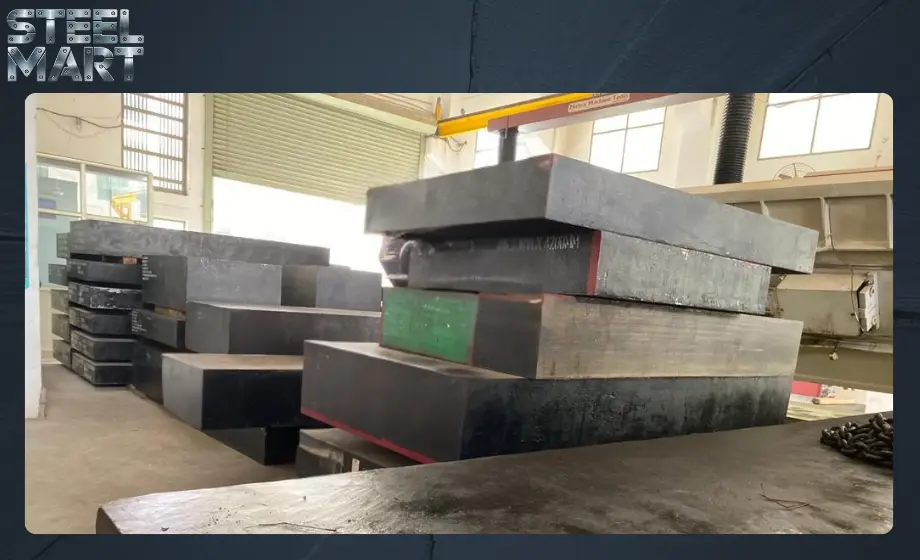- +91 8076217931
- officialsteelmart@gmail.com
- KH. No. 100/17/1, Mundka Industrial Area, Pole No. MDK Near Sentek Factory, New Delhi-110041
Steel Supplier
Plastic Mold Steel -1.2738HH

Chemical Composition (%):
| Element | Composition (%) |
|---|---|
| C (Carbon) | 0.27–0.30 |
| Si (Silicon) | 0.03 |
| Mn (Manganese) | 1.50–1.60 |
| P (Phosphorus) (Max) | ≤0.010 |
| S (Sulfur) (Max) | ≤0.001 |
| Cr (Chromium) | 1.20–1.40 |
| Mo (Molybdenum) | 0.45–0.60 |
| Ni (Nickel) | 1.05–1.20 |
Overview:
VR400 is a premium high hard tool steel specifically engineered for the production of large plastic injection and compression molds—especially for automotive industry applications where exceptional toughness, texturing capability, and through-hardening are critical.
Thanks to its advanced metallurgy and specialized heat treatment process, VR400 ensures uniform hardness through thicknesses of up to 1300 mm, making it ideal for heavy-duty and deep-section mold components.
Key Advantages:
-
Consistent hardness across large cross-sections (up to 1300 mm)
-
Excellent surface polishability
-
High machinability for efficient tooling
-
Outstanding texturing properties for detailed mold surfaces
-
Enhanced thermal conductivity for optimized mold cycle times
-
Improved weldability – comparable to W.Nr. 1.2738
-
Superior toughness for structural integrity under heavy loads
Comparable Standards:
| Standard | Equivalent Grade |
|---|---|
| DIN | VR400 |
| W.Nr | 1.2738 HH |
| JIS | – |
Manufacturing Process:
EAF → LF → VD → Forging → Quenched & Tempered (QT)
Complies with EN 10228-3 Class 4 and SEP 1921 Class E/e standards for quality assurance and defect-free internal structure.
Delivery Condition:
Supplied in quenched and tempered condition with a typical hardness of 360–400 HB (39–43 HRC).
Through-Hardening Capability:
Achieves exceptional through-hardening up to 1300 mm thickness due to a well-balanced chemical formulation and precision-controlled production.
Heat Treatment Recommendations:
| Treatment | Temperature (°C) | Holding Time (min/mm) | Cooling | Notes |
|---|---|---|---|---|
| Annealing | 650 – 700 | ≥2 | Air or furnace | Reduces hardness below 250 HB to enhance machinability |
| Stress Relieving | 500 – 550 | ≥2 | Air or furnace | Recommended after machining to relieve residual stresses |
| Hardening | 860 – 900 | ≥1 | Polymer quench | Followed by tempering |
| Tempering | 550 – 610 | ≥3 | Air or furnace | Perform a second tempering 30°C below the first for optimal results |
Physical Properties (Reference Values):
| Property | 20°C | 100°C | 250°C | 500°C |
|---|---|---|---|---|
| Thermal Expansion (10⁻⁶/K) | 11.4 | 11.6 | 12.7 | 14.2 |
| Thermal Conductivity (W/m·K) | 36.0 | 36.7 | 38.0 | 34.3 |
| Young’s Modulus (kN/mm²) | 211 | 207 | 199 | 166 |
Applications:
-
Large-scale plastic injection molds
-
Compression molds for complex automotive parts
-
Textured mold surfaces requiring high detail precision
-
Die sets and tool holders for heavy-duty applications
Why choose Steel Mart as a C45 Carbon Steel Supplier?
- Certified Premium Quality: They provide high-quality, often ISI-certified C45 Carbon Steel Supplier with complete documentation like Mill Test Certificates (MTCs), ensuring guaranteed chemical composition and mechanical properties.
- Value-Added Processing: They offer essential services like cut-to-size options and processing (machining, grinding) tailored to your exact specifications, which minimizes your processing time and scrap.
- Reliable Supply & Logistics: They maintain a ready and extensive stock of C45 steel in various forms and boast a strong supply chain network for fast, on-time delivery.
- Industry Experience & Trust: With a long-standing legacy (often cited as 50+ years), they bring deep technical expertise and a trusted reputation for reliability and honest business practices.
- Technical Support & Guidance: Their team provides valuable technical advice and consultation on material selection, heat treatment, and fabrication, acting as a supportive partner for your project.



